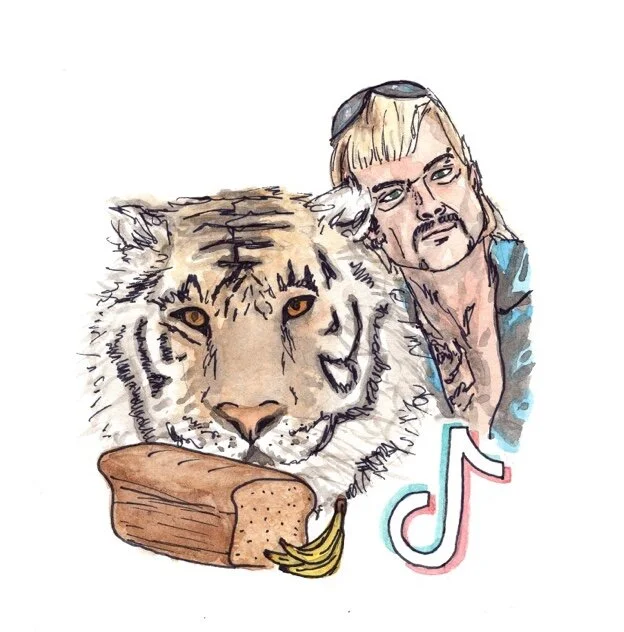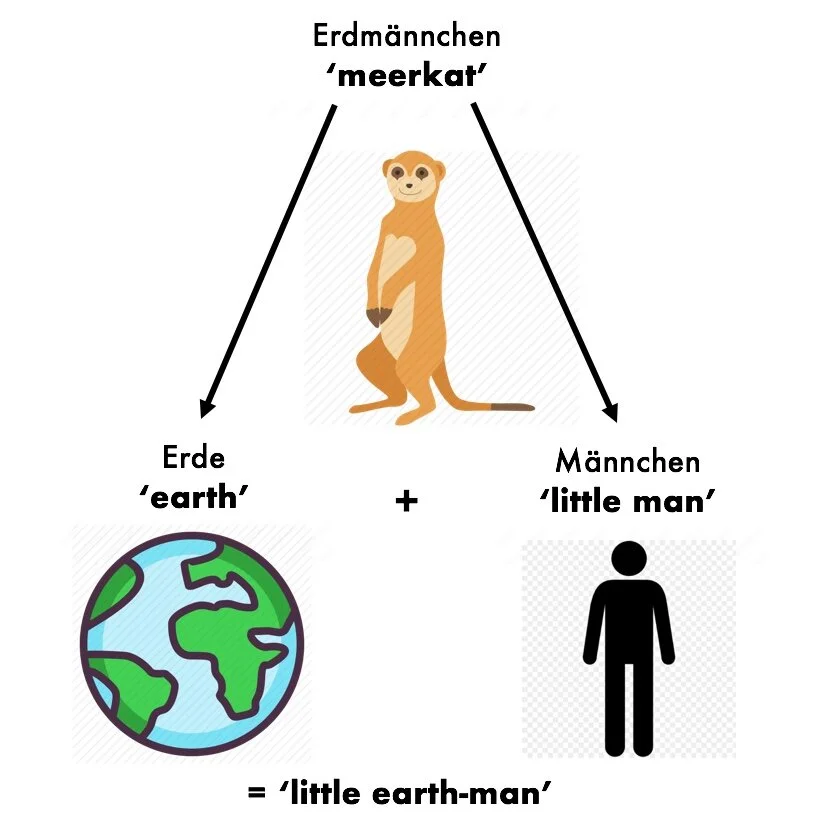Many Rivers to Cross†linguistic: Compound Interest
Greetings, LanGo-rillas!
Today we’re going on a word-watching tour through some of the LanGo team’s favorite compound words. Compounds are words that are put together from smaller words: “cellphone” is made up of “cell” added to “phone”. We find such words endlessly fascinating because they illustrate the odd linguistic arithmetic of 1+1=1.
Think back to science class when you learned about atoms versus molecules, and pure chemicals versus compounds: “H”, for example, stands for hydrogen, the first element, and “O” for oxygen, while water is a compound chemical put together from these two elements: H2O. In chemistry a compound has characteristics distinct from its components. In the example just given, note that water is a liquid at room temperature, while hydrogen and oxygen are both gases. In linguistics, too, a compound word can have properties that make it unlike its components. For example, “to pick” is a verb and “pocket” is a noun denoting an inanimate thing, but the compound “pickpocket” denotes a kind of person (namely someone who picks pockets). You may object that both “pocket” and “pickpocket” are nouns, which is true, but note that a pickpocket is not a kind of pocket!
For today’s selection we’ve emphasized animal names. We hope you enjoy learning how various languages combine words.
CHINESE COMPOUNDS
Compounds are of tremendous importance in Chinese, particularly in modern Mandarin. With a small set of exceptions (mostly loanwords), all words longer than one syllable can be regarded as compounds. Each syllable is represented by one written character, and word spaces are not used in written Chinese, so having a solid knowledge of compounds is a tremendous help in reading.
辦公室 bàn-gōng-shì ‘office’ [‘handle-business room’]
捲心菜 juǎn-xīn-cài ‘cabbage’ [‘roll-heart vegetable’]
龍蝦 lóng-xià ‘lobster’ [‘dragon-shrimp’] (See Fig. 1)
水龍頭 shuǐ-lóng-tóu ‘water faucet, tap’ [‘water dragon-head’]
水母 shuǐ-mǔ ‘jellyfish’ [‘water-mother’]
藤壺 téng-hú ‘barnacle’ [‘vine-pot’]
天氣 tiān-qì ‘weather’ [‘breath of heaven’]
天文 tiān-wén ‘astronomy’ [‘writing of heaven’]
未來 wèi-lái ‘future’ [‘not yet come’]
洗手間 xǐ-shǒu-jiān ‘restroom’ [‘wash-hands room’]
音節 yīn-jié ‘syllable; rhythm’ [‘voice-knot’]
字母 zì-mǔ ‘letter(s); alphabet’ [‘word-mother’]
Fig. 1. Chinese compound 龍蝦 lóngxià ‘lobster’ [‘dragon-shrimp’]
GERMAN COMPOUNDS
German speakers are very fond not just of simple compound words, but of compounds of compounds as well! In German spelling most compounds are written without space or hyphen, resulting in some formidably long words. The term for ‘social sciences’, for example, is Gesellschaftswissenschaften (note that the suffix [-schaft] appears twice!), and one candidate for the language’s longest word that also has a killer rhythm to it is Hottentottenpotentatentantenattentäter ‘assassin of the aunt of the Hottentot potentate’.
One feature about German compounds worth pointing out is that often a meaningless pseudo-suffix is added to the 1st component when a compound is formed. In the 1st example below, the basic word for ‘slap’ is Backpfeife; when Gesicht combines with it, an /n/ intervenes. This /n/ is also seen in the word for ‘squid’ whose 1st component is Tinte ‘ink’.
Backpfeifengesicht ‘slap-face’ [Backpfeife ‘slap’ (= ‘cheek’ + ‘whistle’); Gesicht ‘face’]
Erdmännchen ‘meerkat’ [Erde ‘earth’ + Männchen ‘little man’ → ‘little earth-man’] (See Fig. 2; Note: Our word “meerkat” is from an Afrikaans compound meaning ‘sea-cat’.)
Eichhörnchen ‘squirrel’ [Eiche ‘oak’ + Hörnchen ‘little horn’ → ‘little oak-horn’]
Faultier ‘sloth’ [faul ‘lazy’ + Tier ‘animal’]
Fernrohr ‘telescope’ [fern ‘distant’ + Rohr ‘pipe’]
Gürteltier ‘armadillo’ [Gürtel ‘belt’ + Tier ‘animal’]
Meerschweinchen ‘guinea pig’ [Meer ‘sea’ + Schweinchen ‘little pig’ → ‘little sea-pig’
nachmachen ‘imitate’ [nach ‘after’ + machen ‘do, make’]
Nacktschnecke ‘slug’ [nackt ‘naked’ + Schnecke ‘snail’]
Schildkröte ‘turtle’ [Schild ‘shield’ + Kröte ‘toad’]
Seehund ‘seal’ [See ‘sea’ + Hund ‘dog’]
Stinktier ‘skunk’ [stinken ‘to stink’ + Tier ‘animal’; German speakers who settled in Texas generations ago coined the term Stinkkatze ‘stink-cat’ for this North American animal]
Tintenfisch ‘squid’ [Tinte ‘ink’ + Fisch ‘fish’]
Walross ‘walrus’ [Wal ‘whale’ + Ross ‘horse’ (archaic)]
Waschbär ‘raccoon’ [waschen ‘to wash’ + Bär ‘bear’]
Zahnrad ‘gear’ [Zahn ‘tooth’ + Rad ‘wheel’]
Fig. 2. German compound Erdmännchen ‘meerkat’ [Erde ‘earth’ + Männchen ‘little man’ → ‘little earth-man’].
KOREAN COMPOUNDS
In the Roman-letter transcriptions of the Korean words, the hyphen shows where the 1st component ends and the 2nd begins, while the single dot shows the boundary between syllables. The component no.rae ‘song’ in the word for ‘humming’, for example, is a 2-syllable noun stem.
You may notice that the component meaning ‘nose’ shows up in different combining forms (which linguists call “allomorphs”). In the word for ‘elephant’ it’s 코 (also the modern word ‘nose’), while in the terms ‘humming’ and ‘mustache’, the 1st Hangeul syllable is 콧, with a final letter /s/. Modern Korean generally disprefers the sound /s/ in coda (= final consonant[s] in a syllable), so when we look at the Romanizations of these words we can see various kinds of assimilation.
In the word ‘humming’ the /s/ letter is pronounced just like the following consonant /n/ of the 2nd component: kon-;
In the word ‘mustache’, where /s/ is the first sound of the 2nd component 수염 ‘beard’, we may say either that original /s/ remains unchanged, or that it has assimilated to /s/ -- it’s six of one, half a dozen of the other;
In the word elephant, the basic initial /g/ of the 2nd component ‘length’ (see Fig. 3) is replaced by the tensed consonant /kk/. It appears the old coda /s/ of 코/콧 ‘nose’ has assimilated to the following /g~k/.
안방 an-bang ‘master bedroom’ [‘inside-room’]
참새 cham-sae ‘sparrow’ [‘truth-bird’]
참기름 cham-gi.reum ‘sesame oil’ [‘truth-oil’]
동물 dong-mul ‘animal’ [Sino-Korean ‘moving-thing’, in Chinese 動物 dòng-wù]
코끼리 ko-kki.ri ‘elephant’ [‘nose-length’] (See Fig. 3)
콧노래 kon-no.rae ‘humming’ [‘nose-song’]
콧수염 ko-ssu.yeom ‘mustache’ [‘nose-beard’]
물개 mul-gae ‘seal’ [‘water-dog’]
물고기 mul-go.gi ‘fish’ [‘water-meat’]
눈물 nun-mul ‘tear’ [‘eye-water’]
Fig. 3. Korean compound 코끼리 ko-kki.ri ‘elephant’ [‘nose-length’].
EVERYDAY ENGLISH WORDS from compounds
In this section we turn our attention to the exotic language known as English! Modern English is very fond of creating compounds, so we have no shortage of them. But we have many words whose compound nature is no longer apparent. We hope that at least a few of these etymologies will surprise, amaze, or delight you.
English has taken over thousands of words from French, Latin and Greek. These naturally include many compounds, some obvious and some less so. But what’s more, due to sound changes that have taken place over the centuries, sometimes words that at one stage were transparent English compounds cease to be understood as such, and become unanalyzable wholes. The words below from Old English are examples of this process.
Daisy ‘day’s eye’ [Old English dæges ēage]
Deviate ‘off the path’ [Latin de via]
Enthusiasm ‘inner god essence’ [Greek, 3 components]
Interval ‘between walls’ [Latin inter valla]
Metropolis ‘mother-city’ [Greek] (Note: It’s best not to think too hard about the literal meaning of the wonderful new expression “metro-sexual”...)
Parasite ‘beside-food’ [Greek]
Petroleum ‘stone-oil’ [Greek]
Preposterous ‘before-behind’ [Latin prae post]
Psychiatrist ‘soul-healer’ [Greek]
Rhinoceros ‘nose-horn’ [Greek]
Signify ‘sign-make’ [Latin signum + facere]
Squirrel ‘shadow-tail’ [Greek]
Stirrup ‘climbing rope’ [Old English stigrāp] (Note: The syllable /-rup/ is a reduced form of the word “rope”.)
Werewolf ‘man-wolf’ [Old English werwulf] (See Fig. 4)
Window ‘wind-eye’ [Old Norse vindauga]
Fig. 4 English compound werewolf ‘man-wolf’ [Old English werwulf].
LOANWORDS INTO ENGLISH that were originally compounds
As English speakers delight in taking words from other languages they encounter, we’ve ended up with a lot of foreign compound words in our lexicon. In this last section we’ll put a few of these under the microscope.
Catamaran (kind of seafaring vessel) [Tamil கட்டுமரம் kaṭṭu-maram ‘cut’ + ‘wood’]
Karate (martial art form) [Japanese 空手 ‘empty hands’; compare kara-oke, whose 2nd component is abbreviated from “orchestra”]
Kimono ‘garment’ [Japanese 着物 ‘wearing-thing’]
Mayday (distress call) [not really a compound but the French phrase m’aidez ‘help me!’]
Ouroboros (mythical self-devouring serpent) [Greek ‘tail-eater’; 1st component is also hidden in Eng. “squirrel”, see preceding section]
Shogun ‘military general’ [Sino-Japanese 將軍 shōgun ‘control-army’]
Weltanschauung ‘worldview’ [German ‘world-looking.at’]
Zeitgeist ‘spirit of the times’ [German ‘time-ghost’]
CONCLUSION
To sum up, we’d like to survey a few common pathways of meaning that are available in compounding. Note that though in their form compound words can be analyzed as A+B, in terms of meaning it’s not so simple: meanings are not simply ‘added together’. To illustrate, consider the episode of It’s Always Sunny in Philadelphia in which the gang wants to surprise Charlie by turning things in his dream-book into reality, and they come across the compound “worm-hat”. Not knowing what was intended, they make several options:
a hat made of worms;
a hat that makes the wearer look like a worm; and
a hat for a worm.
On its own a compound word does not give enough information to decide among such options. The number of possibilities is greater than one and less than infinity.
Likely the most common type among the words surveyed here has been aptly called “sub-compound” A+B where B is a noun, and the whole compound is a subtype of noun B. Examples include:
German Fernrohr ‘telescope’ [‘distant-pipe’], which can be regarded as a kind of pipe;
Korean 참새 cham-sae ‘sparrow’ [‘truth-bird’], a kind of bird;
English Stirrup ‘climbing rope’, a kind of rope.
Next, many compounds we saw have a first component denoting a location, and might be called Locative compounds. Recall:
Chinese 水母 shuǐmǔ ‘jellyfish’ [‘water-mother’: mother in the water];
German Seehund ‘seal’ [‘sea-dog’: dog in the sea];
Korean 콧수염 ko-ssu.yeom ‘mustache’ [‘nose-beard’: beard under the nose]; and
Greek Parasite ‘beside-food’.
We should also mention the Possessive compound type, where there is a possessor-possessed relationship between components A and B. In this group we saw:
Chinese 天氣 tiānqì ‘weather’ [‘breath of heaven’];
German Meerschweinchen ‘guinea pig’ [‘little sea-pig’: little pig of the sea];
눈물 nun-mul ‘tear’ [‘eye-water’: water of the eye; Note: Locative interpretation also possible: ‘water in the eye’.]; and
German Zeitgeist ‘spirit of the time(s)’.
Also common across languages is the Object-Verb compound, including:
Greek Psychiatrist ‘soul-healer’;
Latin Signify ‘sign-make’;
Greek Ouroboros ‘tail-eater’;
German Weltanschauung ‘worldview’.
These can also be regarded as a subclass of the preceding Possessive type: ‘healer of souls’, ‘maker of signs’, and so on.
The reverse order (Verb-Object, common in Spanish and other Romance languages) is also encountered:
Sino-Japanese 將軍 shōgun ‘control-army’ (Korean 장군);
Spanish el lavaplatos [‘wash-plates’ →] ‘dishwasher’ (note that though the word incorporates the plural suffix in platos, the whole form is singular as shown by the article el];
English Pickpocket (as well as Killjoy, Scofflaw, Turncoat -- in English members of this compound class the activity denoted is often one that society disapproves of).
Finally, one very intriguing class is that where the compound made up of A+B is both a kind of A and a kind of B. Two in today’s batch fit this description:
English Werewolf ‘man-wolf’ (a kind of man and a kind of wolf);
Greek Metropolis ‘mother-city’ (a kind of city that is a mother to other cities, its colonies).
We hope you’ve enjoyed this post and learned a thing or two you didn’t know before. Whenever you come across a long word whose structure is unclear to you, look it up in a good dictionary: odds are pretty good it’s a compound, and if it is, see if it shares components with any other words you do know, and ask yourself what kind of compound it might be.
[h/t to Andrew Bagley for inspiring this post and to Evan Oxenhandler for its punny title!]































Tools for helping you master some of the trickier points of German grammar, whether you’re learning it for the first time or wanting to review the fundamentals. Los geht’s!